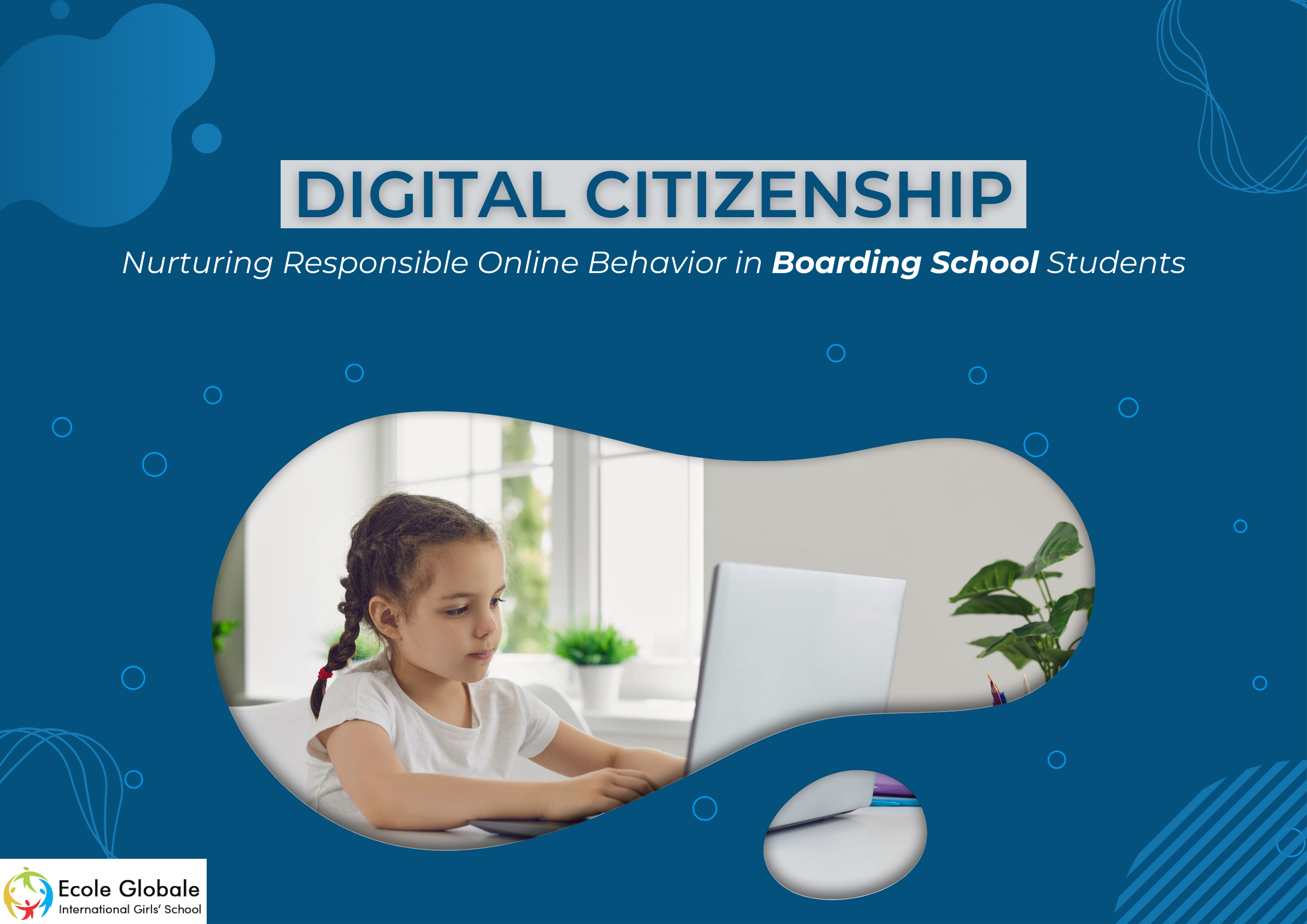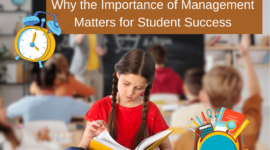In an era dominated by technology, the role of parents in instilling responsible online behavior in boarding school students is more crucial than ever.
Digital citizenship goes beyond understanding the basics of using digital tools; it involves cultivating respect, responsibility, and resilience in the digital realm.
This guide explores the multifaceted landscape of digital citizenship and provides practical tips for parents to foster a safe and positive online environment for their children attending boarding schools.
Understanding Digital Citizenship in Boarding Schools
Definition and Components of Digital Citizenship
Digital citizenship encompasses a range of skills and attitudes that enable individuals to navigate the online world responsibly. The key components include online etiquette and respectful communication, responsible online behavior and privacy, and cybersecurity awareness coupled with digital literacy. As parents, understanding these elements lays the foundation for effective guidance.
Nurturing Responsible Online Behavior: Parental Strategies
Open Communication About Online Activities
Creating an environment where open communication thrives is fundamental to guiding students in their digital journeys. Establishing a safe space for discussions allows parents to gain insights into their children’s online experiences, concerns, and interests.
Actively listening to students’ online experiences fosters trust and encourages ongoing dialogue.
Setting Clear Expectations and Boundaries
Setting clear expectations and boundaries for online behavior is essential for responsible digital citizenship. Establishing family rules for online engagement provides a framework for appropriate conduct.
Consistency in reinforcing these expectations ensures that students understand the importance of responsible online behavior.
Teaching Critical Thinking and Media Literacy
Recognizing Reliable Sources of Information
In an age of information overload, teaching students to distinguish reliable sources from misinformation is critical. Encouraging the evaluation of online content and discussing the impact of misinformation helps build a foundation of media literacy.
Developing Critical Thinking Skills
Critical thinking skills are paramount in the digital age. Parents can guide students in analyzing digital media messages, discerning the intention behind content, and making informed decisions. This approach empowers students to navigate the vast digital landscape with discernment.
Privacy and Cybersecurity Education
Understanding the Importance of Online Privacy
Protecting personal information online is a cornerstone of responsible digital citizenship. Parents should emphasize the importance of online privacy, educating students about the risks associated with sharing personal information and strategies for safeguarding their privacy.
Cybersecurity Best Practices
Teaching cybersecurity best practices is essential for students’ online safety. This includes password management, awareness of online threats, and understanding the security features available on various platforms. Instilling these habits early contributes to a culture of digital security.
Promoting Positive Online Interactions and Digital Etiquette
Fostering a Culture of Respect
Respectful online behavior is integral to a positive digital community. Parents can guide students in treating others online with the same courtesy and respect they would in person. Addressing cyberbullying and online harassment is crucial to maintaining a safe online environment.
Teaching the Consequences of Digital Footprints
Students need to understand that their online actions leave a lasting digital footprint. Parents should discuss the permanence of online actions and emphasize the importance of balancing online interactions with a sense of responsibility.
Utilizing Parental Control Tools and Monitoring
Implementing Age-Appropriate Controls
Parental control tools are valuable resources for managing students’ online activities. Implementing age-appropriate controls, such as content filtering for younger students and gradually easing restrictions for older students, helps strike a balance between safety and independence.
Open Discussions About Monitoring
Transparent communication about parental control measures is crucial. Parents should engage in open discussions with students about the reasons behind monitoring, emphasizing the importance of trust and accountability in the digital space.
Encouraging Positive Online Engagement and Contributions
Supporting Students in Digital Projects and Initiatives
Parents can encourage positive online engagement by supporting students in digital projects and initiatives. This may include creative and educational online activities that contribute positively to the digital community. Recognizing and showcasing such contributions reinforces responsible online behavior.
Involvement in Online Communities and Collaborative Projects
Facilitating supervised involvement in online communities and collaborative projects allows students to develop social and collaborative skills.
Parents should guide students in navigating these spaces safely, ensuring their participation contributes positively to the online environment.
Addressing Cyberbullying and Online Conflict Resolution
Identifying Signs of Cyberbullying
Parents should be vigilant in identifying signs of cyberbullying, including changes in behavior and mood. Creating an open channel of communication allows students to discuss online conflicts, enabling parents to provide guidance and support when needed.
Teaching Conflict Resolution Skills
Teaching conflict resolution skills is crucial for students to navigate online conflicts effectively. Parents can encourage calm and constructive communication, involving school authorities when necessary to address issues within the school community.
Balancing Screen Time and Promoting Offline Activities
Recognizing the Importance of Offline Interactions
While the digital world offers vast opportunities, parents should emphasize the importance of offline interactions. Encouraging face-to-face communication helps students build essential social skills and maintain a healthy balance between their online and offline lives.
Establishing Technology-Free Time Zones
Designating specific times for technology-free activities, such as family dinners and outdoor pursuits, reinforces the importance of disconnecting from screens. Creating a balance between academic and leisure screen time contributes to overall well-being.
Staying Informed About Social Media Trends and Platforms
Keeping Abreast of Popular Social Media Platforms
Parents need to stay informed about popular social media platforms, including their features and potential risks. Understanding the dynamics of these platforms enables parents to guide students effectively and address emerging trends or challenges.
Open Dialogues About Social Media Usage
Engaging in open dialogues about social media usage is essential. Discussing the impact of social media on well-being and encouraging responsible posting and sharing helps students navigate these platforms with mindfulness.
Collaborating with Boarding School Staff on Digital Citizenship Education
Partnerships with School Administrators and Teachers
Collaboration with school administrators and teachers is key to holistic digital citizenship education. Parents can attend workshops and seminars on digital citizenship, fostering partnerships that enhance the overall educational experience.
Collaborative Initiatives for Holistic Education
Parents and school staff can collaborate on initiatives that promote holistic education in digital citizenship. This may include joint efforts to integrate digital citizenship into the curriculum and provide ongoing support for students.
Addressing Online Gaming and Virtual Worlds
Understanding the Appeal of Online Gaming
Recognizing the appeal of online gaming is crucial for parents. Exploring the educational aspects of gaming and setting age-appropriate time limits and game choices help strike a balance between recreational and responsible online activities.
Monitoring Online Interactions in Virtual Worlds
For students engaged in virtual worlds, monitoring online interactions is essential. Parents should ensure that these environments are safe, guide students in responsible online behavior, and discuss the social interactions occurring in virtual spaces.
Encouraging Responsible Device Usage and Digital Detox
Setting Limits on Device Usage
Establishing limits on device usage is vital for students’ well-being. Clear guidelines for screen time help strike a balance between academic and leisure activities. Implementing digital detox periods further supports mental well-being.
Modeling Healthy Device Habits as Parents
Parents should model healthy device habits for their children. Leading by example in responsible device usage reinforces the importance of balance and demonstrates the positive impact of mindful technology use.
Seeking Professional Guidance When Needed
Recognizing Signs of Digital Addiction or Distress
Parents should be vigilant in recognizing signs of digital addiction or distress in their children. Observing changes in behavior and mood can indicate when professional guidance may be necessary.
Consulting with School Counselors and Psychologists
When needed, parents can consult with school counselors and psychologists who specialize in digital well-being. Seeking guidance on balancing educational and leisure technology use and implementing individualized strategies for students with specific needs contributes to a comprehensive support system.
Nurturing a Positive and Safe Digital Journey

Nurturing responsible online behavior in boarding school students is a collaborative effort between parents, school staff, and students themselves.
By understanding the components of digital citizenship, fostering open communication, and actively guiding students in responsible online behavior, parents contribute to a positive and safe digital journey.
Balancing screen time, addressing online conflicts, and staying informed about emerging trends are integral aspects of this journey. The collaboration between parents and school authorities ensures a comprehensive and holistic approach to digital citizenship education.























